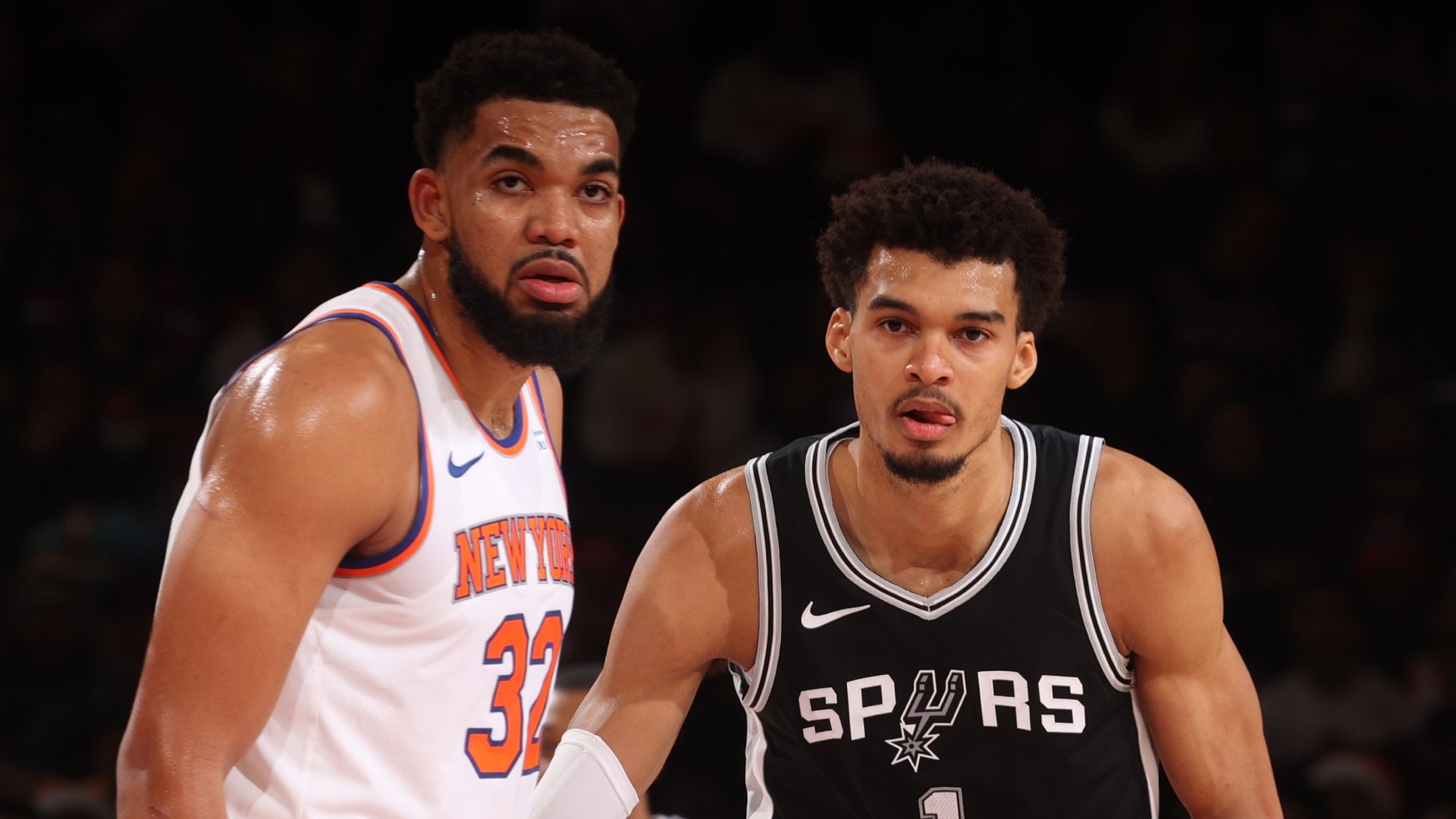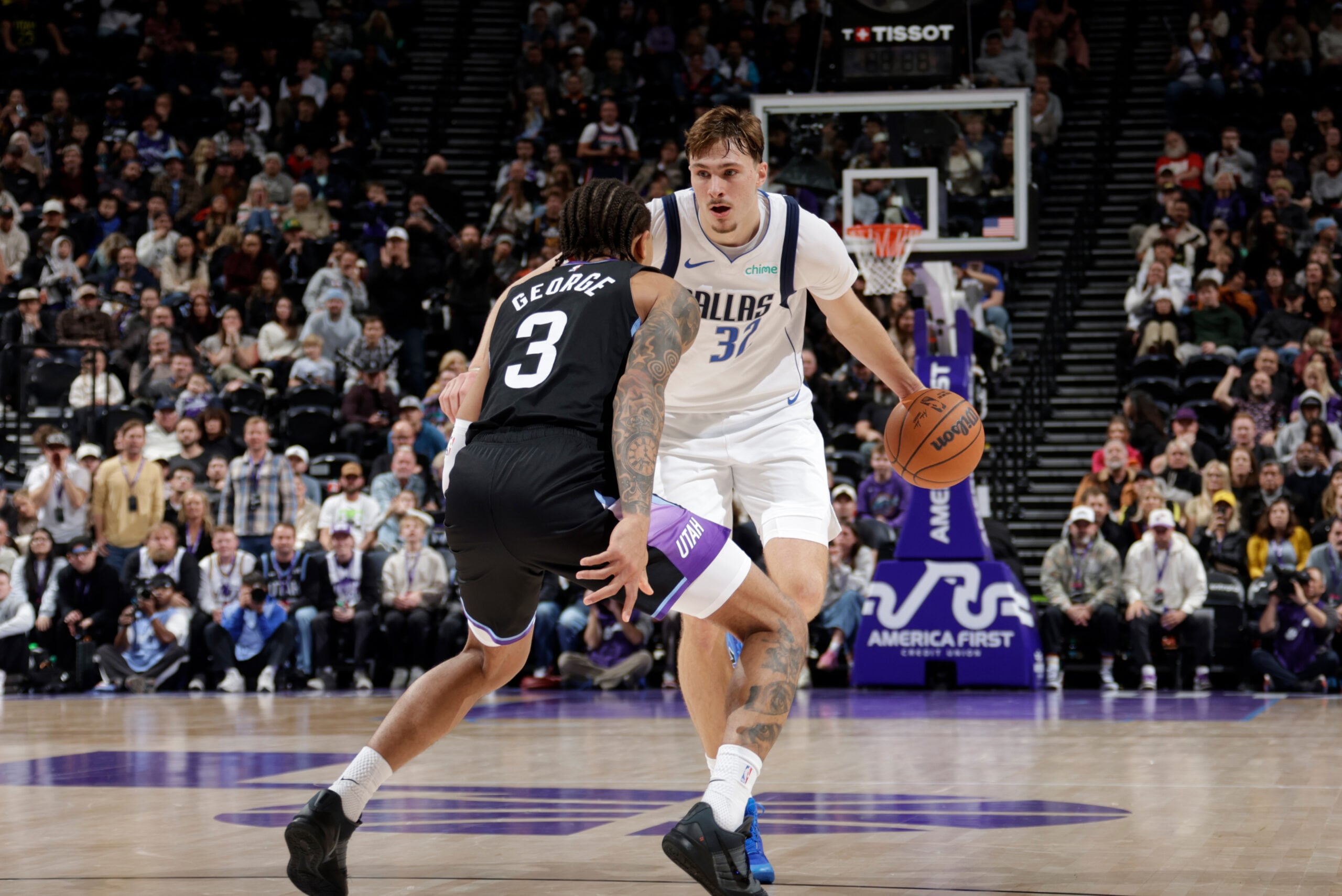
There are 1,230 games in an NBA season and while it may seem like there’s a lot of season left when the calendar flips from November to December, what we’ve already seen at that point will tell us a lot.
Over the last 20 (full) seasons, there has been a strong correlation between a team’s record after 20 games and its record at the end of the season. Really, there’s a pretty strong correlation between a team’s record after just 10 games and how it finishes the season. The correlation grows with each game and the 20-game mark isn’t a significant inflection point in that regard. It is 1/4 of the way through the season and a benchmark that many teams use to take measure of just what kind of team they are.
Like, if you haven’t won at least seven of those first 20 games, you’re most certainly not going to make the playoffs. Only four of the 106 teams that have won fewer than seven of their first 20 games over the last 20 (full) seasons have gone on to reach the postseason. The last of those was the 2013-14 Brooklyn Nets, who started 6-14, finished as the No. 6 seed in the East (at 44-38), and actually won a first-round series.
| Eastern Conference | Western Conference | |||||
|---|---|---|---|---|---|---|
| W thru 20 | Teams | Playoffs | % | Teams | Playoffs | % |
| 12+ | 87 | 79 | 91% | 128 | 118 | 92% |
| 11 | 29 | 21 | 72% | 24 | 12 | 50% |
| 10 | 35 | 23 | 66% | 32 | 12 | 38% |
| 9 | 30 | 18 | 60% | 22 | 10 | 45% |
| 8 | 25 | 7 | 28% | 22 | 6 | 27% |
| 7 | 33 | 8 | 24% | 21 | 2 | 10% |
| 1-6 | 61 | 4 | 7% | 45 | 0 | 0% |
| Playoffs = Made playoffs that season
% = Percentage of teams that made playoffs |
||||||
On the other end of the spectrum, 92 percent of the 215 teams that have won at least 12 of their first 20 games have gone on to make the playoffs. That translates to about one miss per year, with last season’s Memphis Grizzlies (who started 12-8) and the 2017-18 Detroit Pistons (the only Eastern Conference team of the last 20 full seasons that has won 14 of its first 20 games and failed to make the playoffs) being the latest two examples.
* Smith: Key dates to know for 2019-20
The Grizzlies didn’t have that easy of an early schedule last season. Eleven of their first 20 games were against teams that finished with winning records, and 10 of their first 20 were on the road. They obviously couldn’t keep it together after a strong start, but their ’18-19 season was more the exception than the rule.
The schedule eventually balances itself out, but every team wants to get off to a good start. And some will have an easier time than others.
Tough starts for the Pelicans and Thunder
The New Orleans Pelicans and Oklahoma City Thunder are two of the league’s more interesting teams on paper. Both teams traded their best players, but they each still have a seemingly competent rotation remaining. If the pieces — both young and old — come together in the right way, either (or both) of these teams could be competing for playoff spots.
But to remain relevant through the All-Star break, the Pelicans and Thunder will have to survive the league’s two toughest schedules through 20 games.
There were 15 teams that had winning records last season. All but two of the league’s 30 teams will play no more than 12 of their first 20 games against that group, and the two exceptions are the Pelicans and Thunder.
The Pelicans will play 15 of their first 20 games against teams that had winning records last season. One of the other five will be against against the Los Angeles Lakers, who (with former Pelican Anthony Davis) are very likely to finish with a winning record this season. And New Orleans will play four of its 12 back-to-backs within those first 20 games.
The Thunder, meanwhile, will play 14 of their first 20 games against teams that had winning records last season. Two of their other six will be against the Lakers. And within that first 20 games, they will have three *rest-disadvantage games, but just one rest-advantage game.
* A rest advantage or disadvantage is when one team is playing the second game of a back-to-back and the other didn’t play the day before. Here are the records of home teams over the last three seasons…
- With a rest advantage: 448-240 (0.651)
- With neither team rested: 108-65 (0.624)
- With both teams rested: 1,447-1,094 (0.569)
- With a rest disadvantage: 156-132 (0.542)
Interestingly, the Pelicans and Thunder will play each other three times — twice in Oklahoma City and once in New Orleans — within their first 20 games, with a home-and-home series on Nov. 29 and Dec. 1. If one team is struggling to get it together early on, the other could take advantage.
No rest for the young Hawks
The toughest first 20 games in the Eastern Conference — when taking opponents, home vs. road, and rest into account — belongs to the Atlanta Hawks. The Hawks were, statistically, the league’s fourth-most improved team after the All-Star break last season. Given the strength of their first 20 games in ’19-20, it will be tough for them to turn that into a stronger start this year.
The Hawks’ first 20 games include 13 games (most in the East) against teams that finished at or above .500 last season and 11 road games. Five of those 11 are part of a trip (their longest of the season) that concludes with an L.A.-L.A. back-to-back, one of five back-to-backs (most in the league) that the Hawks will have in their first 20 games. The second games of four of those five back-to-backs will be rest-disadvantage games, but the Hawks will have just one rest-advantage game (their first game of the season) in their first 20.
Opportunity for a strong start in Denver
The Denver Nuggets are set to lead the league in continuity, with more than 92 percent of last season’s minutes having been played by guys who are still on the roster. And that’s not the only thing that could allow them to hit the ground running.
In regard to the cumulative 2018-19 winning percentage of their opponents, the Nuggets have the league’s easiest first 20 games. They’ll play 13 of their first 20 games (most in the league) against teams that had losing records last season.
One of the other seven will be against the Lakers, but that game (on Dec. 3) will be in Denver, where the Nuggets will play 11 of their first 18 before heading East for a four-game trip. Last season, the Nuggets were 13.1 points per 100 possessions better at home than on the road, and that was the league’s biggest differential.
Overall, the first 20 games is balanced in regard to home-away. Only six of the league’s 30 teams don’t have at least nine home games and at least nine road games in their first 20.
Less stress, more rest …
The league has once again reduced the average number of back-to-backs for each team. This season, the average is 12.4 back-to-backs per team, down from 13.3 last season and 19.3 five years ago. Teams will have no fewer than 11 and no more than 14 back-to-backs. Last season, the range was 12-15, and in 2014-15, it was 16-22.
| Season | Avg. B2B | Total RA |
|---|---|---|
| 2014-15 | 19.3 | 392 |
| 2015-16 | 17.8 | 384 |
| 2016-17 | 16.3 | 349 |
| 2017-18 | 14.4 | 327 |
| 2018-19 | 13.3 | 300 |
| 2019-20 | 12.4 | 293 |
| Avg. B2B = Back-to-backs per team Total
RA = Total rest advantage games, where one team is playing 2nd game of a back-to-back & the other isn’t. |
||
There’s been less of a reduction in rest-advantage games, from 300 last season to 293 this season. That’s still an all-time low, but there remains a bigger variance in the number of rest-advantage (and rest-disadvantage) games than there is in the number of back-to-backs.
While the back-to-back range is 12-15, teams have as few as five and as many as 16 rest-advantage games. They also have as few as five and as many as 13 rest-disadvantage games.
On the low end of the former is the Orlando Magic, who have a league-low five rest-advantage games (and one of the five is the last game of the season). The New York Knicks, meanwhile, have 16, including two four-game stretches (one in November and one going into the All-Star break) where they’ll have three rest-advantage games.
The Chicago Bulls have a league-low five rest-disadvantage games, and the first one isn’t until Jan. 11 (Game 40) in Detroit. In fact, in none of the Bulls‘ first 25 games will either team have a rest advantage.
The Cleveland Cavaliers and Phoenix Suns have the most rest-disadvantage games (13). The Suns have three in a seven-game stretch in December, while the Cavs have four in their first 13 games after the All-Star break.
If you subtract rest-disadvantage games from rest-advantage games to get an overall “rest advantage factor” for each team’s 82 games, the Bulls (11 rest-advantage games, five rest-disadvantage games) and Knicks (16, 10) have the easiest schedule, with no other team having a differential greater than three. The Magic (five, 10) and Washington Wizards (seven, 12) have the biggest differentials in the other direction.
Some Eastern Conference notes

- The Boston Celtics have a fairly early (five-game) trip out West. But when they get back from that, they have a two-and-a-half-month stretch (36 games from Nov. 25 through Feb. 7) where they will play just four games outside the Eastern time zone, with just one trip of more than two games (a three-game excursion through Orlando, New Orleans and Miami). They’ll pay for that stretch coming out of the All-Star break, when 12 of their first 18 games are on the road before coming home for a six-game homestand (twice as long as any other homestand on their schedule) from March 27 – April 8.
- The Brooklyn Nets are one of the seven teams with a league-low 11 back-to-backs, and they’ll only have three in their first 34 games, which is a relatively easy stretch in regard to opponents as well. The Nets will play 18 of their first 33 games on the road, but only 13 of those 33 games are against teams that had winning records last season (and none are against the Lakers).
- The Charlotte Hornets‘ longest homestand is five games from Dec. 2-10. And over the 2 1/2 months following that, they will have just one homestand of more than one game, and that’s just two games (Jan. 6 and 8) against Indiana and Toronto. From Dec. 11 through the end of February, the Hornets will play 21 of 33 games on the road or at a neutral site (they play the Bucks in Paris on Jan. 24). Their nine-game stretch from Dec. 15 through Jan. 2 is the league’s longest stretch of alternating home and road games this season.
- Based on last season’s point differential per 100 possessions, home vs. away, and rest, the Cavs have the league’s toughest six-game stretch of the season from Dec. 7-16. It starts in Philadelphia with a rest-disadvantage game. They then go to Boston and return home for a game against the Rockets, which is the first game of a back-to-back. The last three games of the stretch are a three-game trip through San Antonio (rest disadvantage), Milwaukee and Toronto.
- The Detroit Pistons have the league’s most East-heavy schedule early on. They will play their first 10 games and 21 of their first 23 within the conference, with home games against Minnesota and San Antonio being the exceptions. They won’t play in a Western Conference arena until they visit New Orleans on Dec. 9.
- Like the Pistons, the Indiana Pacers will play their first 10 games within the Eastern Conference. And the Pacers will be the last team to play in the Mountain or Pacific time zones, not doing so until they play in Denver on Jan. 19.
- The Miami Heat have 25 games from Dec. 23 until the All-Star break, and 20 of those 25 games will be against teams that had winning records last season. That stretch includes three of their four games against the Magic, as well as two games each against Indiana, the Clippers, Philadelphia, Portland, San Antonio and Utah.
- The Celtics and Heat (12 of their first 20 games on the road) have the most road-heavy starts to the season in the East.
- When you base schedule-strength on last year’s numbers (either winning percentage or point differential), the Milwaukee Bucks are going to have the easiest 82-game slate, because they’re the only team that doesn’t have to play the Milwaukee Bucks. The Bucks also have the easiest 10-game stretch based on last year’s numbers (along with home-away and rest). They have a stretch from Nov. 27 to Dec. 14 where seven of the 10 games are at home and six of the 10 are against Atlanta, Charlotte, Cleveland (x 2), Memphis or New York. Their one home-game against the Clippers is in the middle of that stretch, though.
- The Knicks have the longest continuous stretch of games against teams that had winning records last season. They’ll play 11 straight against that group from Nov. 20 to Dec. 11, though six of the 11 will be at home.
- The Philadelphia 76ers will host marquee games on the first full night of the season (against Boston) and on Christmas (against Milwaukee), but each of those games is followed by a road-heavy stretch. After opening with the Celtics at home, the Sixers will play nine of their next 12 games on the road. And after hosting the Bucks on Christmas, they’ll play 13 of their next 19 on the road.
- The Toronto Raptors‘ schedule is really a month-by-month thing. In December, 11 of their 16 games are at home. In January, 10 of their 15 games are on the road. In February, eight of their 10 games are at home. And in March and April, 14 of their 23 games are on the road.
- The Wizards are the only team that begins the season with a three-game road trip.
Some Western Conference notes

- The Dallas Mavericks will have a chance to get off to a solid start to the season. They have the West’s second easiest first 20 games in record to cumulative opponent ’18-19 record, and they’re one of two teams (Chicago is the other) that don’t have a rest-disadvantage game in their first 20. They weirdly start the season by alternating home and road games through their first seven.
- The Golden State Warriors have the most West-heavy start to the season, with 16 of their first 18 games within the conference. That includes three of their four games against the Thunder.
- The Houston Rockets are one of four teams (the Warriors, Lakers and Raptors are the others) that have the same number of rest-advantage games as they do rest-disadvantage games. They have eight of each, though five of the eight rest-advantage games are before Christmas (in their first 29 games overall) and two of them (against New Orleans and Oklahoma City) are part of a three-game homestand to start the season.
- Among teams expected to compete for playoff spots, the Los Angeles Lakers have the league’s easiest five-game stretch of schedule (based on home-away, rest and last year’s pace-adjusted numbers). It’s a five-game homestand from Dec. 29 to Jan. 7, with visits from Dallas, Phoenix, New Orleans, Detroit and New York.
- The Memphis Grizzlies have the most home-heavy first half of the season, with 23 of their first 41 games (and just 18 of their last 41) at FedExForum. And it starts with the most home-heavy first 20 games, with 13 of their first 20 in Memphis. Only two other teams – the Clippers and Suns (12 each) – will play more than 11 of their first 20 games at home.
- The Minnesota Timberwolves are the only team that doesn’t have a homestand of at least four games. They do have six different three-game homestands and a late-season stretch (from March 22 to April 9) where they play eight of 10 at the Target Center.
- The entire league has only 19 five-games-in-seven-days stretches and more than half of the league (16 teams) doesn’t have any. But the Portland Trail Blazers have three. One is in November, right before they go on one of their two six-game trips. The second is leading into the All-Star break, and the third is the last five games of their other six-game trip, with the last three coming in Boston, Philadelphia and Brooklyn. The three other teams that have more than one five-games-in-seven-days stretch are the Cavs, Warriors and Suns, who have two each.
- The Blazers are also the only team with 13 of their first 20 games on the road. Their first homestand of more than two games isn’t until early December (Games 22-25). No other Western Conference team plays more than 11 of its first 20 games on the road.
- The Sacramento Kings will be the only team with a “Texas Triangle” trip this season, playing three straight road games in Texas. They’ll be in San Antonio on Dec. 6 and then play a Dec. 8-9 back-to-back in Dallas and Houston. The last team to sweep the Texas Triangle was the 2007-08 Celtics and three of the last four teams that have done the trip (including last season’s Warriors) have lost all three games.
- The San Antonio Spurs have another eight-game, rodeo road trip. This one has six games before the All-Star break and only two after. No other team has a road trip longer than six games, though nine others have uninterrupted, six-game trips.
- The Rockets and Spurs are the only teams that begin the season with a three-game homestand.
- The Utah Jazz seem to always have a road-heavy first half of schedule. This season isn’t as drastic as last season (when they played just 16 of their first 41 games at home), but they still have the most lopsided schedule in regard to home-away in the first 41 vs. the second 41. They’ll play just 18 of their first 41 at home.
- The Jazz have a funky, nine-game stretch from Jan. 25 to Feb. 10 in which they play two games each against Dallas, Denver, Houston and Portland. And in six of those nine games, one team or the other (the Jazz in four, their opponent in two) will have a rest advantage.
* * *
John Schuhmann is a senior stats analyst for NBA.com. You can e-mail him here, find his archive here and follow him on Twitter.
The views on this page do not necessarily reflect the views of the NBA, its clubs or Turner Broadcasting.










